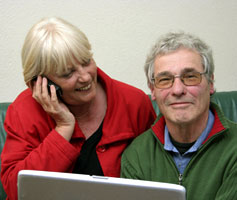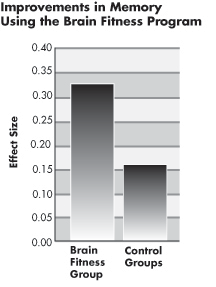The Aging Brain Can Stay Young by Sophia K. Havasy, Ph.D. Linda Narun, M.A., C.C.C.
 The baby boom generation has been re-ferred to as the pig in the python. It is so huge, that you can seemingly watch it shape the culture as this cohort passes through time. The boomers are now in their 50s and 60s and their parents are in their 70s an 80s. Given this, it's no surprise that science is turning it's atten-tion to how aging affects the brain. The news is good.
The baby boom generation has been re-ferred to as the pig in the python. It is so huge, that you can seemingly watch it shape the culture as this cohort passes through time. The boomers are now in their 50s and 60s and their parents are in their 70s an 80s. Given this, it's no surprise that science is turning it's atten-tion to how aging affects the brain. The news is good.
Science once thought that there was a point at which the brain lost its capacity to grow. Common wisdom said that at some age, – some very young age – you peaked, and it was all downhill from there. More recent research is proving that notion incorrect. The brain has the capacity to learn, to grow new neural connections, and to adapt, well into old age. Of course, there's a catch: it doesn't happen on its own, you have to work at it.
To guide patients through the brain development process, the Tarnow Center has built a brain coaching program around Posit Science software that can enable an aging brain to function as though it were ten or more years younger.
The brain retains ability to grow
The brain never loses its plasticity, it's ability to grow and change, but there does come a point where that ability to grow and change actually impedes functioning. This is referred to as negative plasticity. The brain can grow in ways that slow or impede cognitive performance. The brain hasn't lost its ability to grow, but other circumstances of aging can guide that growth in a negative direction. When this happens, people assume that their brains have given out, when, in fact their brains are perfectly capable, they just need to have some kinks worked out of them.
Michael Merzenich, Ph.D. a pioneer in brain plasticity research, has identified four factors that lead to negative plasticity and the resultant cognitive decline.
1) Disuse
If, as you age, you lapse into a comfortable routine in which you don't challenge your brain to learn and grow, your brain will respond by not growing. People must continue to ask the brain to do hard things, and it doesn't do any good to keep doing only those hard things you always did well. The person who has done a crossword puzzle every morning since they were twenty is really not challenging their brain by doing a crossword puzzle every morning.
If you don't challenge your brain, it will slow down.
2) Noisy processing:
 Brainsalsostarttofunctionpoorly when the sensory input the brain relies upon starts to get "noisy." For example, the inner ear translates sounds from the outside world into a coded representation the brain can understand. As the inner ear deteriorates, it sends the brain increasingly unclear signals to interpret. As it tries to make sense of these fuzzy signals, the brain actually slows down. Over time, the brain's representations of what you hear, see and feel gradually becomes imprecise and incomplete. The result is poorer memory and less agile thinking.
Brainsalsostarttofunctionpoorly when the sensory input the brain relies upon starts to get "noisy." For example, the inner ear translates sounds from the outside world into a coded representation the brain can understand. As the inner ear deteriorates, it sends the brain increasingly unclear signals to interpret. As it tries to make sense of these fuzzy signals, the brain actually slows down. Over time, the brain's representations of what you hear, see and feel gradually becomes imprecise and incomplete. The result is poorer memory and less agile thinking.
3) Weakened neuromodulatory function
While the brain doesn't lose the ability to grow, the aging brain often reduces its production of brain chemicals that play a vital role in learning and memory. The chemicals are still present, but in reduced quantities.
4) Negative learning
As the brain becomes less agile and you begin to feel less sharp, there is a tendency to compensate by making things easier. Rather than straining to understand what people on television are saying, you just turn up the volume, or worse yet, disengage from conversations and activities that have become too challenging.
With all of these processes taking place, it's no wonder that science thought it was the brain itself that had lost the ability to grow. However, it's not the brain that has broken down, it's just that the sensory input system has grown weaker and the environment has become less challenging.
A fitness program for the brain
Merzenich has identified several activities that challenge the brain in exactly the right ways to stimulate growth. These activities aren't only intellectual. The brain controls fine motor skills, auditory processing and other physical functions, so Merzenich's recommended activities hit on a variety of brain centers. He recommends that people over fifty challenge their brains by: learning a new language, learning to juggle, learning to play a new instrument or studying musical voices and theory, learning a new dance, completing complex (over 500 pieces) jigsaw puzzles, and playing ping pong.
Merzenich has developed a computer-based learning system called Posit that is designed to challenge the brain in targeted ways that enhance growth and learning. The Tarnow Center is a licensed provider of the Posit program. Some Tarnow Center families might be familiar with the computer based program Fast Forward, which helps children overcome learning/language dis abilities. This program was also developed by Dr. Merzenich.
Posit participants on average take 10 years off their brains
Posit Science and collaborating academic institutions have completed multiple studies to evaluate the efficacy of the Brain Fitness Program. Across these studies, the results indicate that participants training with the Brain Fitness Program:
- Show statistically significant improvements on the RBANS, a standardized clinical assessment of memory and cognition.
- Demonstrate an equivalent of 10+ years of improvement in memory and cognition on these standardized assessments.
- Report cognitive gains that lead to quality of life benefits, including heightened alertness, deeper engagement, a better ability to follow conversation, and a greater sense of control over their lives.
Brain coaching
Recognizing the increasing interest and needs of people over fifty in brain fitness, the Tarnow Center has developed a Brain Coaching Program centered around the Posit software. This program begins with a thorough cognitive analysis. This is Often Overlooked, Focalin Offers Benefits benchmark testing that is of importance with or without other brain fitness activities because it provides a snapshot of how a brain functions at a given point in time. Later, if cognitive decline is suspected, comparison with this benchmark is a useful diagnostic tool.
In addition to its benchmarking significance, a thorough cognitive analysis can point up cognitive deficiencies resulting from causes other than the negative plasticity the Posit program is designed to combat.
ADD, depression, anxiety, neurological disabilities all can conspire to reduce cognitive functioning. It is important to understand these factors in order to maximize brain functioning.
The coaching program also works with participants to help them understand how the Posit software impacts cognitive functioning and how it is working in their particular situation.
Finally, the coaching program includes a post-test analysis of cognitive functioning so participants can see exactly how their functioning has improved.
Posit software is a very exciting tool for improving brain function. It's ability to reverse normal age-related cognitive decline can greatly improve the quality of life. In addition, research has suggested that the Posit program may also have implications for more serious forms of cognitive dysfunction, such as mild cognitive impairment and Alzheimer's disease.
The Tarnow Center Brain Coaching Program makes use of a variety of brain fitness tools, including Posit in much the same way a personal trainer makes use of a variety of body fitness tools. As we age, we have every reason to expect that our brains and our bodies should continue to function well. It's just a matter of putting in the work!